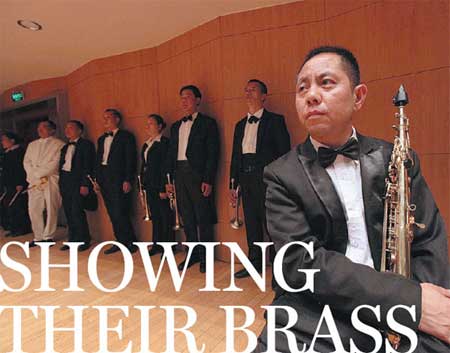 |
|
Members of the Beidou Village Farmer Orchestra wait for a rehearsal with the China National Symphony Orchestra in Beijing. Jiang Dong / China Daily |
|
After a lifetime of farming, members of a village orchestra arrive in Beijing with their French horns and trumpets - and a new outlook on life. Deng Zhangyu catches up with an unlikely band. Three years ago, they were famers cultivating their land with hoes and sickles. Their daily life was all about planting corn and raising their families. Late last month, however, the 16 farmers from a village in Chongqing performed with the China National Symphony Orchestra at the Beijing Concert Hall, unveiling their new identity - the farmer orchestra from Beidou village. Before the concert, Zhou Yongshu firmly gripped her French horn to her chest, hands shaking a little. The dress shirt and pants she wore were bought from a wholesale market. It's the fourth time Zhou wore her most expensive clothes. Like her band companions from the village, Zhou was ignorant of musical notation until very recently. She couldn't tell the difference between a trombone and a trumpet, and she'd never heard of Beethoven before 2011. After less than three years' learning and practicing, Zhou can play more than 20 melodies. The Beidou Village Farmer Orchestra performed two songs with the China National Symphony Orchestra and another two on their own at the Beijing Concert Hall on March 10. "It's like a dream! I never thought that I could have the chance to perform on such a big stage," 43-year-old Zhou says. In 2011, the China National Symphony Orchestra visited Beidou village as part of a program to take culture to rural areas. The orchestra decided to help set up a local wind band: It donated the instruments needed and provided regular classes for farmers in the village. At first, many people applied to learn but quit quickly due to the difficulties of playing the instruments. There were only seven farmer players who never gave up from the original group, says Yang Xiaogang, head of Beidou village, a mountainous place one-hour drive from Chongqing. "All the villagers are farmers. Most of them know nothing about music, let alone the Western instruments," the village head says. Before Zhou started to learn to play her French horn, her only knowledge of music was folk songs she heard on TV. The only thing related to music she did besides her farm work was dancing with a group of people in public places, an exercise popular across China. Zhou has to do the housework and cook for her family of five. During the growing season, she has to help with farm chores. Like her neighbors, she spent her spare time playing cards or mahjong with other villagers. "I thought that was all my life. But playing the French horn opened another door for me. I suddenly found my interest and my passion for life," Zhou says. Yang Xiaorong, captain of the orchestra, says there were moments when everyone wanted to give up. Many villagers complained about the noise the musicians made when they practiced together, says Yang. Some said the band's music sounded like cows mooing. "When we started, many couldn't even blow the instruments. Even now, we can only read numbered musical notation," says the captain, who plays the drum in the band. Yang is the oldest player, age 63. He has two sons, a driver and a chef. All his life, he has been a farmer, a carpenter and a migrant worker. He says no one in his family ever dreamed of playing in a band. Yang wears a 120-yuan ($19) swallow-tailed coat whenever he has the chance to play on a stage. He stands squarely, with confidence in his eyes. "I'm very proud of myself. It's difficult for the young to learn a musical instrument in three years. I did it and I love my band," Yang says. Every week, players of the band practice together two or three times. They often meet early in the morning, practice for about three hours and go home to work in their fields. The band has expanded from seven to 16, including nine different instruments. They have performed publicly three times, but this opportunity in Beijing is their biggest stage. In fact, most of them are visiting the capital for the first time. After the farmer orchestra's rehearsal, players from China National Symphony Orchestra applauded loudly. "Their performances are not perfect, but very passionate. That's what impresses us the most," says Tian Shaoming, an oboe player in the professional orchestra. |
中国日报4月16日电(记者邓章瑜)在田里耕作了一辈子之后,北斗村农民管乐队的队员们带着圆号和小号抵达北京——还带着新的人生观。 三年前,他们都是拿着锄头镰刀在地里耕种的农民。那时,种庄稼、养家糊口就是他们全部的日常生活。然而,上个月下旬,这16名来自重庆一个乡村的农民与中国国家交响乐团在北京音乐厅同台献艺,揭开了他们的新身份——北斗村的农民管乐队。 音乐会开始之前,周永淑紧紧地抱着胸前的圆号,双手微微颤抖。她穿的白衬衫和裤子是从一个批发市场买来的。这是她第四次穿上她这套最贵的衣服。 和其他北斗村管乐队的队员一样,周永淑直到最近才懂得看乐谱。在2011年之前,她分不清长号和小号,也从没听说过贝多芬。3年不到的时间里,她不断地学习和练习,现在她会演奏20多首曲子。 3月10日在北京音乐厅,北斗村农民管乐队与中国国家交响乐团合作演奏了两首曲子,还单独演奏了另外两首曲子。 “像做梦一样!我从来没想过我可以有机会在这样一个大舞台上表演,”43岁的周永淑说道。 2011年,中国国家交响乐团送文化下乡,访问了北斗村。国家交响乐团决定帮助村民筹建一支管乐队:不仅捐赠了所需乐器,还定期在村里为农民授课。 起初,很多人申请学习,但很快放弃了,因为学习乐器很难。北斗村书记杨孝刚说,从乐队组建之初到现在,只有7名农民乐手从没放弃。北斗村是一个山村,距离重庆有一个小时的车程。 “所有的村民都是农民。绝大多数都对音乐一窍不通,更不用说西洋乐器了,”村书记说道。 在周永淑开始学习演奏圆号之前,她对音乐的了解仅限于在电视上听到的民歌。除了农活之外,她所做的事中唯一和音乐有关联的,就是跳广场舞,这是在中国很流行的一项运动。 周永淑必须做家务,为一家五口做饭。在农忙季节,她还得帮忙做农活。和她的邻居一样,她在闲暇时间与其他村民打牌或打麻将。 “我以前认为这就是我所有的生活。但是学习演奏圆号为我打开了另一个门。我突然间找到了我的兴趣,唤起了我对生活的热情,”周永淑说道。 杨孝云是管乐队的队长,他说,很多时候,每个人都想放弃。 杨孝云说,当他们聚在一起练习时,很多村民抱怨乐手制造的噪音。一些村民说乐队的音乐像黄牛在叫唤。 “刚开始的时候,很多队员甚至都吹不响乐器。即使到现在,我们也只能看懂简谱,”队长说道,他在乐队中打鼓。 杨孝云今年63岁,是最年长的队员。他有两个儿子,一个是司机,一个是厨师。他的一生就三种身份:农民、木匠、农民工。他说,他家里没有一个人想过能在乐队里演奏。 每当杨孝云有机会在舞台上表演时,他就穿上那套价值120元的燕尾服。他笔直地站着,眼里满是自信。 “我为自己感到骄傲。在三年内学会一种乐器是很难的。我做到了,我爱我的乐队,”杨孝云说道。 每周,乐队的乐手在一起练习两到三次。他们经常在清晨聚集,练习3小时后,再各自回去种地。 乐队从原先的7名队员增加到现在的16名,演奏九种不同的乐器。他们公开表演过三次,但这次北京的舞台是他们登台以来最大的。事实上,大部分队员是第一次来到北京。 农民管乐队彩排完之后,中国国家交响乐团的演奏家们为他们热烈鼓掌。 “他们的演奏虽然不完美,但充满了热情。这给我们留下了最深的印象,”田少明说道,他是中国国家交响乐团中的双簧管演奏者。 (译者 darcy012123 编辑 Julie) 扫一扫,关注微博微信
  |
